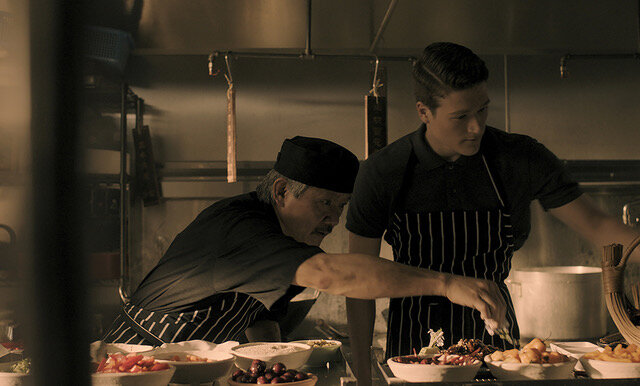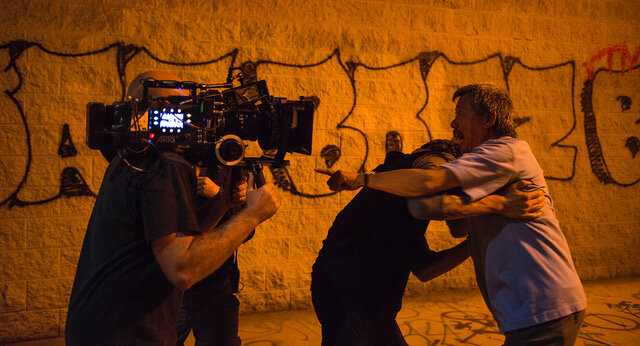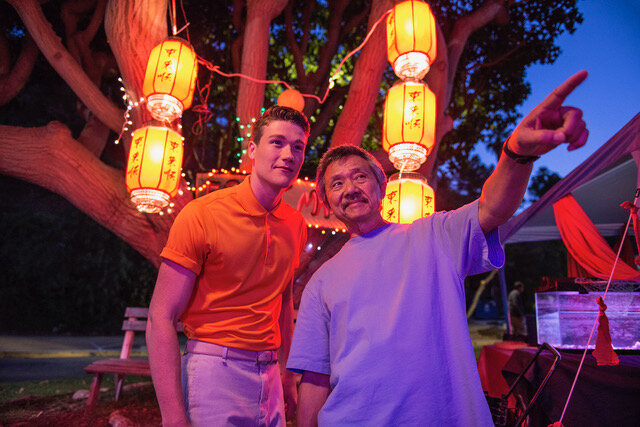Scheduled for publication in 2020 with Focal Press/Routledge, my book, provisionally entitled WHAT’S THE STORY? — THE DIRECTOR MEETS THE SCREENPLAY has been described in peer reviews as a game-changer like nothing else on the market. This is a book for both the director and writer-director, and indeed for members of all filmmaking crafts and for informed cinephiles too. Its focus lies in the nexus of dramatic construction and filmic discourse — by which I mean the storytelling, visual language, and flow of emotion and thought among characters and audience essential to both movie (whether short or feature) and TV show. Rooted in sixteen years of teaching around 450 directors in the Thesis Presentation Class at AFI Conservatory, in which the director’s preparation for production — specifically the understanding of dramatic construction that informs all elements of directing craft — would be explored and articulated each week, the book expands the topics the class dealt with to cover some twenty-two aspects the director needs to know in depth in order to tell their story effectively and make a successful film.
Here are some extracts. May you find them useful. May you find them thought-provoking!
************************************************************************
When filmmaking students (and some teachers too) are asked to tell the story of a film, they will often begin by saying It’s a story about… or even simply It’s about… Say Wong Kar Wei’s IN THE MOOD FOR LOVE is the film considered, they might offer It’s a story about a two lonely people, or It’s a story about a two lonely people in a relationship, or simply It’s about loneliness and love. None of these sentences describe a story. Two lonely people refers to the film’s main characters. Two lonely people in a relationship describes characters in a particular circumstance. It’s about loneliness and love is more of a thematic than a narrative notion, a concept, an abstraction. Of course it’s important for the director to know their characters, to grasp their condition, their circumstances or state of being, and of course it’s helpful to have a sense of the thematic aspects of their movie or TV episode and what these may be about, but unless the director understands what a story is, they won’t be able to tell one, and if they can’t tell one they won’t be able to incorporate those other aspects — characters, circumstances, theme — into the elements of their craft.
A story is a progression of incident. Two lonely people fall unexpectedly in love but faced by their mutual sense of guilt, find themselves unable to maintain their romance so go their separate ways. That’s a story.
************************************************************************
How should the film announce itself and what might the audience see? A person, people, an object, a setting — whether a room, a place, a vista, or what? Should the director start their film with a wide shot or a big close up? Should the frame be empty or full? Should the image be shown immediately or should it be discovered? And what of the choice of framing? Might something be shown in its entirety or only in part? How will the aspect ratio, the proportions of the frame, affect these decisions?
************************************************************************
When talking about tone one is thinking of the attitude of the filmmaker, whether screenwriter or director, to their material. A tone may echo the world of the film and its atmosphere, its moods, the emotions of its characters, the pitch and stakes of the drama or it may be at odds with those elements. Tone is not so much rooted in the characters and their predicament as in the screenwriter’s and directors’s attitude towards them, which may or may not be sympathetic. At any moment there may be a single tone or there may be two dissonant tones. A tone may be heightened or muted. A tone suggests an emotional dimension, although it may equally undercut or suppress emotion. In some ways it can be similar to the voice of a filmmaker and it certainly informs it, but it is not the same thing — voice suggests more a perspective on material, a vision of life and humanity particular to the filmmaker.
************************************************************************
The nature of a physical world may embody a thematic dimension, a deep connection to what the story is about — and when this occurs, the visual and the dramaturgical come together in cinematic unity. During the pre-production of THE ENGLISH PATIENT, writer-director Anthony Minghella posited the story’s desert landscape as a visual metaphor. The true map of the world that the film reveals, he said, is the map not of nations but of humanity, so he thought there should be moments in the film when the desert resembles the human body, when it might even be mistaken as such. The opening of the movie presents that very concept, the camera high above a desert vista as it tracks over its rolling dunes. With nothing to give context, either to the nature of the image or its scale, there is visual ambiguity until the shadow of a plane appears (even this at first resembles the human form), followed by the plane itself, glinting in the sun as it flies below the camera. The audience might see the terrain as desert or as human flesh, as vast or intimate. Thus the theme of the film is encapsulated in a single shot while at the same time one of its two worlds — the other is rural Tuscany — is deftly established.
************************************************************************
Having understood the intentions of the screenwriter as regards Narrative Point of View and what might be its shifts and flow, the director can employ resources and visual language in order to articulate it that will include casting, mise-en-scène, camera (lensing, placement, movement), sound, music, and editing. When taking into account NPOV, the director does not merely “cover” a scene, shooting whatever angles and footage are required as raw material for its editing, (“hosing it down”, as journeymen put it), but selects what is needed in order to capture and convey the perception and experience of a particular character or characters.
************************************************************************
A protagonist may be neither a hero nor an anti-hero but simply a character in the throes of adverse circumstances over which they have limited or no control. The conflict and/or tension of such a story may be more interesting than a duel between the good and the bad. In Asaph Polonsky’s ONE WEEK AND A DAY, the protagonist Eyal Spivak has to cope with, and ultimately overcome his grief over his son’s death, a challenge as formidable as any presented by a vindictive opponent, and one that has universal resonance. There is no willful antagonist, no struggle for power, no contest between any one side and another, only the painful situation with which Spivak has to cope, in which the configuration of the characters is less one of offense and defense, to be reversed from act to act, than of a shared and faltering defense against the emotional agonies inflicted by a devastating loss.
************************************************************************
In a story, life must go wrong. A J Byatt wrote in her novel Ragnarok: It was a good story, a story with meaning, fear and danger were in it, and things out of control. When these elements are not merely brushed aside by a triumphant hero but have consequences, or when the actions the hero takes in order to overcome those forces themselves come at a cost and when that cost becomes evident at the story’s ending, a film stays with its audience. In short, when the irreconcilable opposites that inform dramatic construction and thematic paradox are incorporated into a film’s ending by both screenwriter and director, the film finds its voice.
************************************************************************
Looking forward to seeing you in class!
Peter Markham




